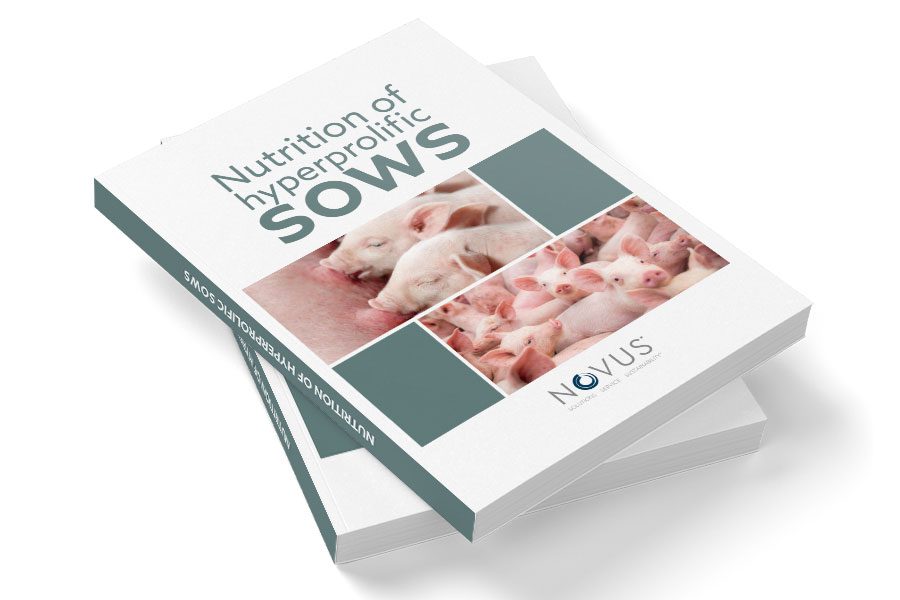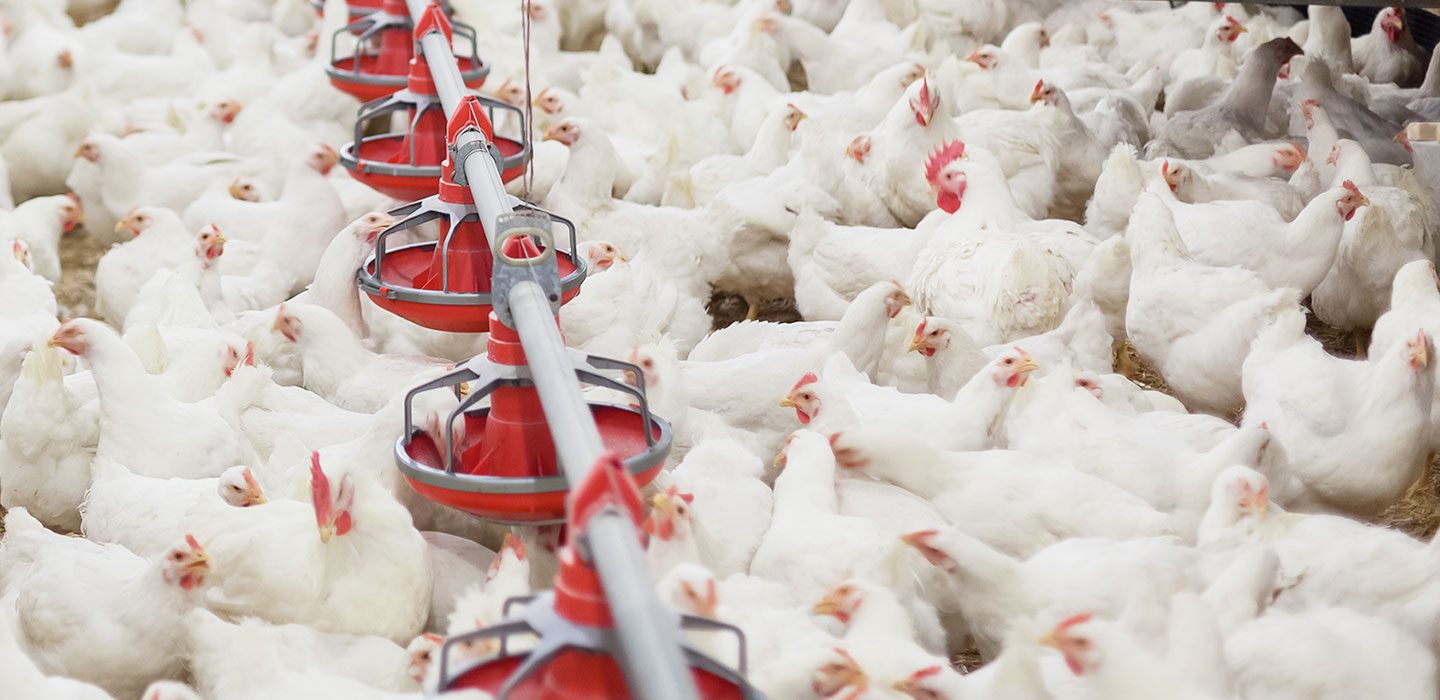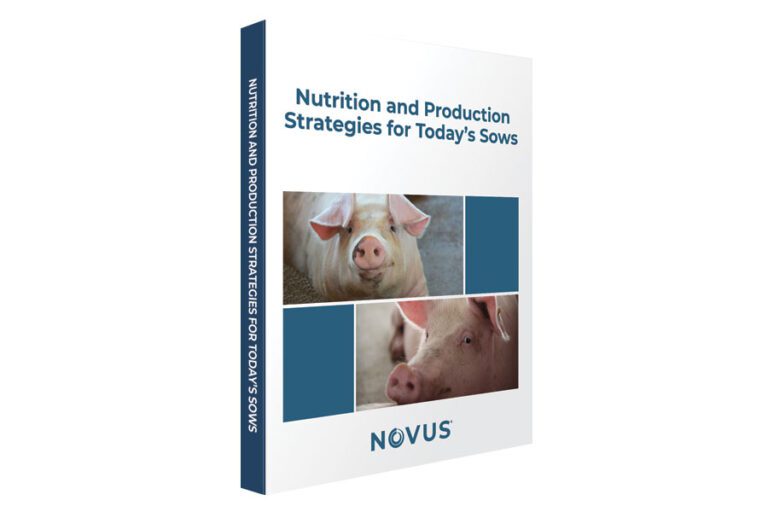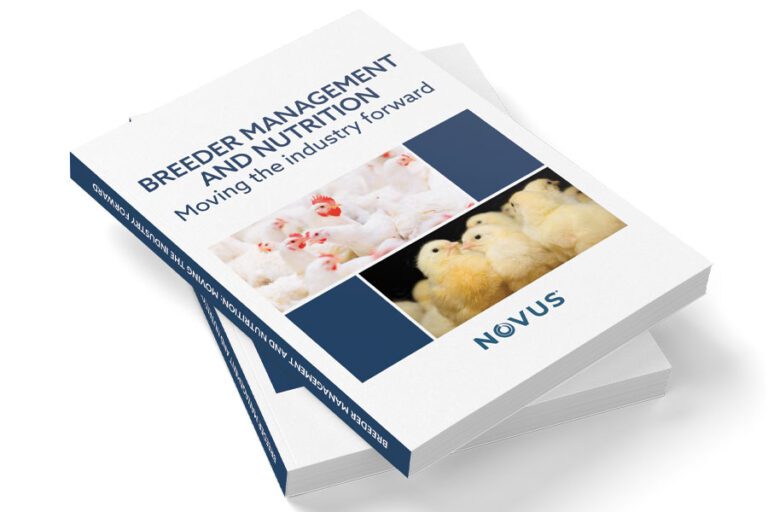Nutrition of Hyperprolific Sows eBook

Introduction
The eBook, Nutrition of Hyperprolific Sows is a comprehensive compilation of data and information on the ever-changing nutritional requirements of the modern hyperprolific sow. The collaborators, led by Dr. Antonio Palomo Yagüe, set out to build a compendium of knowledge that could be used as a central reference on the current challenges faced with these sows. This book can serve as a reference for nutritionists, researchers, veterinarians, producers, professors, geneticists and allied swine industry personnel.
The book is a result of an international effort involving several industry professionals representing all facets of nutrition, health, production and research. The team has assembled feeding recommendations and trends in feeding, established new nutritional requirements for these hyperprolific sows and defined the link between nutrition, endocrine status and reproduction in pigs.
Chapters
- Use of hyperprolific sows and implications – Antonio Palomo Yagüe
- Welfare of hyperprolific sows and their piglets – Xavier Manteca Vilanova & Josep Gasa Gasó
- Objective measures of lameness and the role of trace minerals and nutrition in skeletal development of gilts and sows – Karen Wedekind
- Overcoming oxidative stress – Krzysztof Lipiński
- Evolution of the feeding approach in sows during the last decades – Jean-Yves Dourmad
- Trace mineral nutrition in gilts and sows for optimum performance – Ping Ren
- Dietary fiber for welfare and productivity of sows – Pedro E. Urriola, Lee J. Johnston and Gerald C. Shurson
- Role of supplemental methionine sources in hyperprolific sows: protein synthesis and beyond – Roberto Barea Gaitán
- Mammary uptake of metabolites and requirements of energy and amino acids of hyperprolific sows during lactation – Laura Greiner
- Genetic influences on intra-uterine growth retardation of piglets and management interventions for low birth weight piglets –
- Sandra Edwards, Stephanie Matheson and Emma Baxter
- Modulation of gene expression in progeny with maternal nutrition of trace minerals – Juxing Chen
- Management protocols in lactation piglets from hyperprolific sows – Luis Sanjoaquin Romero
Fill out the form to get your digital copy
Other Authors
Antonio Palomo Yagüe was born in a family of farmers and now is the director of the swine division of SETNA NUTRICION S.A.U-ADM (Archer Daniels Midland, company founded in 1902), a Spanish company specialized in premixes and technical consultancy. He works in the company since 1999, and in parallel, since 1994, is Associated Professor at the Department of Animal Medicine and Surgery of the Veterinary Sciences Faculty of the Complutense University of Madrid (Spain). Previously, he worked during 13 years as a technical director in Spain for other companies, like PREMIX IBERICA-INVE GROUP, a Belgian group of feed mills, premixes and technical consultants, and NUTRIGANSE (Nutricion Ganadera Segoviana), a feed mill and pig producer company. In 2004 he became counselor of Ibericos Arauzo S.L., six farms with 8.000 Iberian sows located in the south west of Spain. Palomo holds a degree in Veterinary Medicine from the Complutense University of Madrid, as well as specific swine education programs, obtained in Europe and USA. He also holds a swine continuing education certification full credit from the American Association of Swine Veterinarians (AASV) and is member of more than 20 scientific committees in national and international pig congresses and symposiums, and associations. Since two years ago he is elected member of the scientific committee of the Spanish Pig Welfare. Palomo is very close to the private industry and belongs to the advising committees of experts for European private companies. In addition, he has collaborated in 8 CDTI R&D projects and is co-author in more than 500 publications.
Xavier Manteca Vilanova received his BVSc and PhD degrees from the Autonomous University of Barcelona and an MSc in Applied Animal Behaviour and Animal Welfare from the University of Edinburgh. Currently, he is full professor of animal behaviour and animal welfare at the School of Veterinary Science in Barcelona. His main area of interest is the welfare of farm animals, mainly pigs and dairy cattle. He has published about 200 papers in peer-reviewed journals and has been member of several working groups on farm animal welfare of the World Animal Health Organization (OIE) and the European Food Safety Authority (EFSA). Xavier is a diplomate of the European College of Animal Welfare and Behavioural Medicine (ECAWBM).
Josep Gasa Gasó holds a B. Vet. Med. in Animal Production and Economics (1980) and a PhD in Animal Nutrition (1984) from the University of Zaragoza (Spain). Currently, he is full professor of Animal Science (pig production and nutrition) at the University Autonomous of Barcelona (UAB, since 1995). The main research topics havebeen: rumen metabolism and ruminant feeding (1980-93), pig nutrition and feeding (1992-2008) and pig feeding and management (since 2008). He is co-author of more than 70 papers in SCI Journals. Josep is a diplomate of the European College of Porcine Health Management (ECPHM).
Karen Wedekind received her master’s degree in animal science from University of Kentucky, PhD in Animal Science from University of Illinois, and a Post-doc from the University of Nebraska. Her thesis, PhD, and post-doc research evaluated the bioavailability of trace minerals (zinc and manganese) in broilers and swine. Dr. Wedekind is an author/co-author on 30 peer-reviewed papers (9 NOVUS publications), 4 book chapters (1 NOVUS), and 22 patents (2 NOVUS pending patents). During her time at NOVUS, Dr. Wedekind was responsible for conducting research trials across multiple species (poultry, swine, rats, equine, pets) across numerous platforms, primarily involving trace minerals and enzymes.
Dr. Wedekind’ s biggest accomplishments at NOVUS were 1) the development of lameness models in both rats and swine and published NOVUS lameness research in rats, equine, swine and camels, 2) demonstrated efficacy of DP100 protease in diets/ ingredients high in trypsin inhibitors (TI) resulting in reduced pancreas weight and increased ileal amino acid digestibility in broilers, and 3) helped develop a MINTREX® Trace Mineral profit tool that demonstrates the profitability of MINTREX® Trace Minerals vs inorganic trace minerals (ITM) in poultry. Dr. Wedekind was also a co-inventor on two pending Novus patents. The first patent demonstrated efficacy/synergies between phytase and MINTREX® Trace Minerals, demonstrating that Ca and P utilization is improved with MINTREX® Trace Minerals vs ITM. The second patent demonstrates the efficacy of MINTREX® Trace Minerals (in swine) decreasing bone and cartilage turnover and increasing bone and cartilage synthesis.
Krzysztof Lipiński works in the Department of Animal Nutrition and Feed Science, Faculty of Animal Bioengineering at University of Warmia and Mazury in Olsztyn. He is the author or co-author of 125 original scientific papers, including four textbooks, and around 322 publications for the general public and booklets. Prof. Lipiński’s main research interests focus on monogastric animal nutrition, with particular emphasis on the sources of protein and energy in diets for pigs and poultry as well as the efficacy of feed additives. In his studies, Prof. Lipiński evaluated the suitability of selected feed raw materials as diet components, and determined the effects of various supplements and additives, including enzymes, probiotics, prebiotics, herbs, and organic forms of minerals. The subject of interest was also the influence of various feed additives and methods of grinding feed materials on gastrointestinal morphology and health status of monogastric animals. In studies on pigs and poultry, he assessed the antioxidant status of the body, the effect of various factors such as heat stress, mycotoxins and the quality of fat on the activity of antioxidant enzymes and the level of antioxidants in the body. He also investigated the impact of natural antioxidants (vitamins, polyphenols) on the performance, health status and meat quality.
Qualifications: 1985-1990 Study of Animal Science, University of Agriculture and Technology in Olsztyn, M.Sc.; 1994 PhD in Agricultural Science, University of Agriculture and Technology in Olsztyn; since 1989 scientist in the Department of Animal Nutrition and Feed Science of University of Warmia and Mazury in Olsztyn. Present Position: Scientist in the Department of Animal Nutrition and Feed Science UWM.
Relevant experience: 30 years’ experience in animal nutrition studies.
Jean-Yves Dourmad is senior researcher in the “Pig Farming System” research group of PEGASE Research Unit at INRA-Agrocampus Ouest, located in Saint-Gilles (France). He was born on a small pig and dairy farm in Brittany. He graduated from AgroParisTech Paris were his obtained his PhD on the modelling of nutrition of the sow during the reproductive cycle. He joined INRA in 1983 where he conducted, with his colleagues Michel Etienne and Jean Noblet, a research program on energy and protein nutrition of sows. In 1990 he initiated a new research program on the evaluation and reduction of the environmental impact of pig production systems, through nutritional approaches. His research is based on both experimental and modelling approaches. He is author or co-author of 155 peer-reviewed papers, 20 book chapters and about 250 contributions to national and international scientific congress. He is co-authors of three software tools and coordinated the development of the sow module of InraPorc© decision support tool. He chairs the transdisciplinary “Pig research committee” of INRA and he is member of the organizing committee of the “French Swine days”.
Ping Ren received his master’s degree in Swine Nutrition from Ministry of Agriculture and Feed Industry Centre (MAFIC) at China Agricultural University (CAU) in June 2011. His master research focused on evaluation of the energy and amino acid digestibility in several Chinese feed ingredients, including corn, soybean meal, wheat bran and corn distillers’ dried grains with solubles using growing pigs. He finished his PhD program in Swine Nutrition at University of Minnesota in December 2016. His Ph.D. work focused on investigating effects of feeding levels during several short periods of gestation on sow and litter performance, nutrient digestibility and energy homeostasis. Dr. Ren is an author of 9 peer-reviewed papers, 14 meeting abstracts, 1 book chapter, 1 funded research proposal by Minnesota Pork Board, and 2 pending US patents. During his time at NOVUS, Dr. Ren was responsible for conducting swine research across numerous platforms, including chelated trace minerals, phytase, organic acids, essential oils, as well as methionine hydroxy analogue. Dr. Ren research demonstrated using NOVUS chelated Zn (MINTREX® Zn Trace Mineral) at 100 ppm could replace 2000 ppm Zn as ZnO in the first 4 wks after weaning. His research also illustrated that maternal feeding of MINTREX® Zn, Cu and Mn Trace Minerals could potentially reduce gut inflammation and improve muscle hypertrophy in their progeny compared with progeny from sows fed inorganic trace minerals. Additionally, his recent research demonstrated that total sulfur amino acid requirement in first two phases after weaning was increased by 13 to 31% in pigs raised under antibiotics-free regime, compared with NRC (2012) recommendation.
Pedro E. Urriola graduated in 2003 from Universidad Central de Venezuela with a bachelor’s degree in veterinary medicine, then a MS at the University of Minnesota, and PhD in Swine Nutrition at the University of Illinois. The topic of Pedro’s Ph.D. dissertation was dedicated to the use of dietary fiber in diets of growing pigs. Currently, Pedro is an Assistant Professor at the Department of Animal Sciences and the Department of Population Medicine at of the University of Minnesota. Pedro, along with Dr. Lee Johnston and Gerald C. Shurson, continue work on nutritional evaluation of industrial co-products especially corn co-products. A special emphasis of the research is the understanding energy and physiology aspects of feeding dietary fiber to pigs. Pedro is also involved in projects on the management and control of infectious diseases by dietary means in collaborations with the College of Veterinary Medicine.
Lee J. Johnston has been a faculty member in the Department of Animal Science at the University of Minnesota since 1988 and has reached the rank of Professor. He is located at the West Central Research and Outreach Center in rural, western Minnesota. Dr. Johnston’s current responsibilities include delivering educational programs to pork producers and other industry professionals, conducting swine nutrition and management research, and supervising the West Central Research and Outreach Center’s swine research unit. His primary research interests are nutrition and management of the sow, feed ingredient evaluation, renewable energy use in pork production, and management of systems for pork production. As a part of this work, Lee has published over 116 scientific papers, 177 scientific abstracts, 4 book chapters, and secured nearly $7 million in research support. Lee was named the Distinguished Alumnus by the Penn State Department of Dairy and Animal Science in 2014 and that same year was named a “Master of the Pork Industry” by National Hog Farmer magazine. He also serves as Director of Operations at his research center and oversees programs in Dairy Production, Renewable Energy, Horticulture, and Agronomy. Dr. Johnston received his B.S. in Animal Production from Pennsylvania State University in 1982, his M.S. in Swine Nutrition from Texas Tech University in 1984 and his PhD in Swine Nutrition and Management from Michigan State University in 1988. Dr. Johnston and his wife, Judy, live on a small farm in Morris, MN and operate a small flock of Dorset ewes. Lee and Judy have a daughter and son that are graduates of the University of Minnesota’s Department of Animal Science and are employed by institutions of higher learning in agricultural education and research.
Gerald (Jerry) Shurson received his B.S. degree in Animal Science and Agricultural Economics at the University of Minnesota, and his M.S. and PhD degrees in swine nutrition at Michigan State University. He is currently a Professor in the Department of Animal Science at the University of Minnesota with responsibilities for research, on-campus teaching, and extension. He serves on numerous graduate student committees and has advised 45 PhD and M.S. students. Jerry is best known for his research contributions on determining the nutritional value of corn co-products produced by the fuel ethanol industry, but his diverse research program also involves numerous studies to better understand fiber, lipid, amino acid, and trace mineral nutrition in swine. He also serves as the Coordinator of the University of Minnesota Integrated Animal Systems Biology Team, which has developed numerous industry research partnerships to evaluate mechanisms of growth and health responses from feed additives and other nutritional interventions. His research program has resulted in 115 refereed publications, 187 abstracts, 26 book chapters and white papers, 4 DDGS Handbooks, 94 conference proceedings, and has generated over $18 million in research funding. He has presented his research findings to audiences in over 25 countries and has served as a consultant for the U.S. Grains Council for the past 20 years, where he provides educational programs and market assessments to increase demand for U.S. DDGS in export markets. He also has served in several professional leadership roles including Board of Directors and President of the Midwest Section of the American Society of Animal Science Board, and Director of the University of Minnesota Swine Center. In recognition of his outstanding contributions to DDGS and corn co-product research, technical advising, and international market development, Shurson received the 2012 Award of Excellence, which is the highest award given by the U.S. ethanol industry. In 2014, Shurson was also selected as the recipient of the American Feed Industry Association Nonruminant Nutrition Research award for his outstanding accomplishments in swine nutrition research.
Roberto Barea Gaitán is Technical Service Manager – South East Europe at NOVUS Europe NV and is EME swine specialist. He joined NOVUS in February 2015. Dr. Barea graduated in 1999 at the University of Cordoba (Spain) in Veterinary Medicine. He defended his PhD thesis in 2005 in Swine Nutrition at the Institute of Animal Nutrition, EEZ-CSIC (Granada, Spain). After completing his PhD, Dr. Barea completed a postdoctoral fellowship of 2 years at UMR-SENAH (INRA, France) in the topic of branched-chain amino acid requirements in post-weaned piglets. During this swine research period, he was a visiting scientist at different research centers and Universities such University of Copenhagen (Denmark) and Universita degli Studi di Milano (Italy). In 2011, Dr. Barea moved to Milan (Italy) and since that year he works in the feed additives industry, with the main task of coordinate and integrate his technical responsibilities to sales and marketing forces. Since 2015, Dr. Barea provides technical support to NOVUS’ sales organization and customers in South East EU Area (Italy, Balkans, Greece and Israel) while focusing on NOVUS’ portfolio and program priorities. Dr. Barea is the author or co-author of more than 30 publications, of which 13 in peer-review journals.
Laura Greiner is currently an assistant professor at Iowa State University. She received her master’s and PhD degrees from Iowa State University focusing on swine nutrition and immunology. She also was a post-doctorate at the University of Iowa in the Microbiology department. After her education, she worked as the Director of Research for Carthage Innovative Swine Solutions where she conducted studies focusing on all phases of swine production and all aspects of swine health, nutrition and wellbeing. Her areas of interest have focused on sow nutrition and suckling pig management as well as the interaction of disease on growth and reproduction.
Sandra Edwards graduated with a BA (Hons) in Natural Sciences at the University of Cambridge, and then completed a PhD on livestock management and welfare at the University of Reading. She has since worked for more than 30 years in applied research for the UK Agricultural Development and Advisory Service, the Institute for Grassland and Animal Production, and the Scottish Agricultural College, where she has had responsibility for a range of projects on cattle and pig housing and welfare, nutrition and management. From her position as Head of the Animal Management and Health Department of SAC, she moved in 1998 to become Reader in Animal Science in the Department of Agriculture at the University of Aberdeen. In 2000, she was appointed to the Chair of Agriculture at the University of Newcastle, where her research interests focused on the multidisciplinary interactions between nutrition, reproduction, behavior and welfare in pigs and other farm livestock. In 2017, she retired to take the status of Emerita Professor. She has been active in a number of national and international academic and industry committees, including Council member of the European Federation of Animal Science and President of the British Society of Animal Science. She has also been a member of the UK Farm Animal Welfare Council and of the Animal Health and Welfare Panel of the European Food Safety Authority.
Stephanie Matheson is a Research Associate at the University of Newcastle, with expertise in animal breeding and the genetics of offspring survival and behaviour. She works closely with industry, investigating the impacts of production selection strategies on behaviour and welfare. Her PhD investigated the genetic background of offspring survival traits in sheep and developed proxy systems capable of identifying differences in neonatal behaviour related to survival. She has also been involved with work exploring cognitive shifts resulting from environmental changes and work investigating the effects of enriched environments on animal welfare in the gamebird industry. Her research interests include the genetics of neonatal survival and the development of systems able to quantify behaviour in industrial systems. Her current research is in the field of precision livestock farming looking at automated detection of behavioural changes caused by disease challenges, with the aim of developing an early warning system suitable for commercial farms.
Emma Baxter is a research scientist at Scotland’s Rural College (SRUC), with expertise in animal welfare and behaviour and interests in integrated pig science. Her PhD investigated the behavioural and physiological indicators of piglet survival in a range of farrowing environments. She now works on various projects involving designing loose farrowing systems, supporting and monitoring commercial uptake, collating free farrowing information into a web-based platform (www.freefarrowing.org) and gathering on-farm data regarding selecting suitable sows for loose farrowing. Additional work on sow and piglet welfare includes collaborations with Danish colleagues on the effects of hyper-prolific breeding programmes, finding solutions to sow hunger and investigating links with gastriculceration. She is also involved in precision livestock farming projects looking at automated detection of imminent tail-biting outbreaks, individual recognition and detection of affective states using facial biometrics and facial expression. She is also studying alternative humane stunning methods for pigs. She is an active member of a number of national and international committees including the EU sub-group for pig welfare and the RSPCA’s Scientific and Technical Advisory Group for pig standards. She works on commercial farms with all those involved in the supply chain and provides consultancy. She publishes regularly in peer-reviewed journals, writes for books, popular and industry press, as well as teaches and supervises veterinary and animal science students at graduate and post-graduate level.
Juxing Chen is a scientist (gastrointestinal health) at Nestle Purina Pet Care. During her time at NOVUS, she developed animal models and biological assays to understand causation of problems and to investigate potential solutions with new or existing NOVUSproducts. She also collaborated with a variety of research scientists and provided input on experimental design, structural and functional understanding of experimental animal models, and mode of action of feed additives in poultry, swine and ruminants. As a manager, she oversaw the physiology group to provide cellular, molecular, biological and histological assays for internal research scientists, external collaborators and customers.
Dr. Chen’s research has focused on structural integrity, meat quality, epigenetics, gut health, and oxidative stress. Her research has resulted in five peer-reviewed articles in well-known scientific journals, such as Scientific Reports, Poultry Science, Frontiers in Cellular and Infection Microbiology, etc., as well as numerous speaking engagements and presentations at scientific meetings such as the Poultry Science Association annual meeting, International Poultry Scientific Forum, World Poultry Congress, and Gut Health Symposium.
Previously, Dr. Chen lectured at Shanghai Jiaotong University in China until 2004 when she became a postdoctoral fellow and research associate in the Cell and Developmental Biology group at Oregon Health and Science University in Oregon, U.S. During her research, she investigated the molecular mechanism by which iron dysregulation causes a genetic disease called hereditary hemochromatosis and gained very extensive and solid experience in molecular biology, cell biology, biochemistry, immunology and histology.
Dr. Chen earned her bachelor’s degree in biology and master’s degree in microbiology from the Central China Normal University. Later, she completed her doctorate in biochemical engineering from East China University of Science and Technology. Dr. Chen has served in various scientific and poultry organizations including the American Society for Biochemistry and Molecular Biology, the International BioIron Society, and the Poultry Science Association.
Luis Sanjoaquin Romero is a swine veterinarian with more than 20 years of experience. His career began caring for more than 3,000 pigs in a large swine integrator, which provided a hands-on education in the inner workings of a pigfarm. This knowledge led him to a veterinary services company where he worked as a swine consultant until breaking off to become a private consultant overseeing projects for the Health Defense Group swine farmers in the Sobrarbe region of Spain, as well as serving individual clients.
In 2014 Luis and business partner Antonio Vela founded ThinkinPig, an international swine consultancy company. Their aim is to provide customized services to swine client through methodologies and solutions that are practical to day-to-day practices on the farm. This includes biosecurity protocols, comfort and wellbeing measures, options for pharmaceutical-free production, and other steps farmers can take to help improve sanitary conditions and production margins. The company also conducts research trials. Luis has presented his experience at various industry events throughout the world and has been included in industry publications. His book, “Handling of Hyperprolific Sows” was published in 2014.

Intelligent Nutrition for Your Business
More science. More insight. More inspiration. More ways for you to feed the world.




